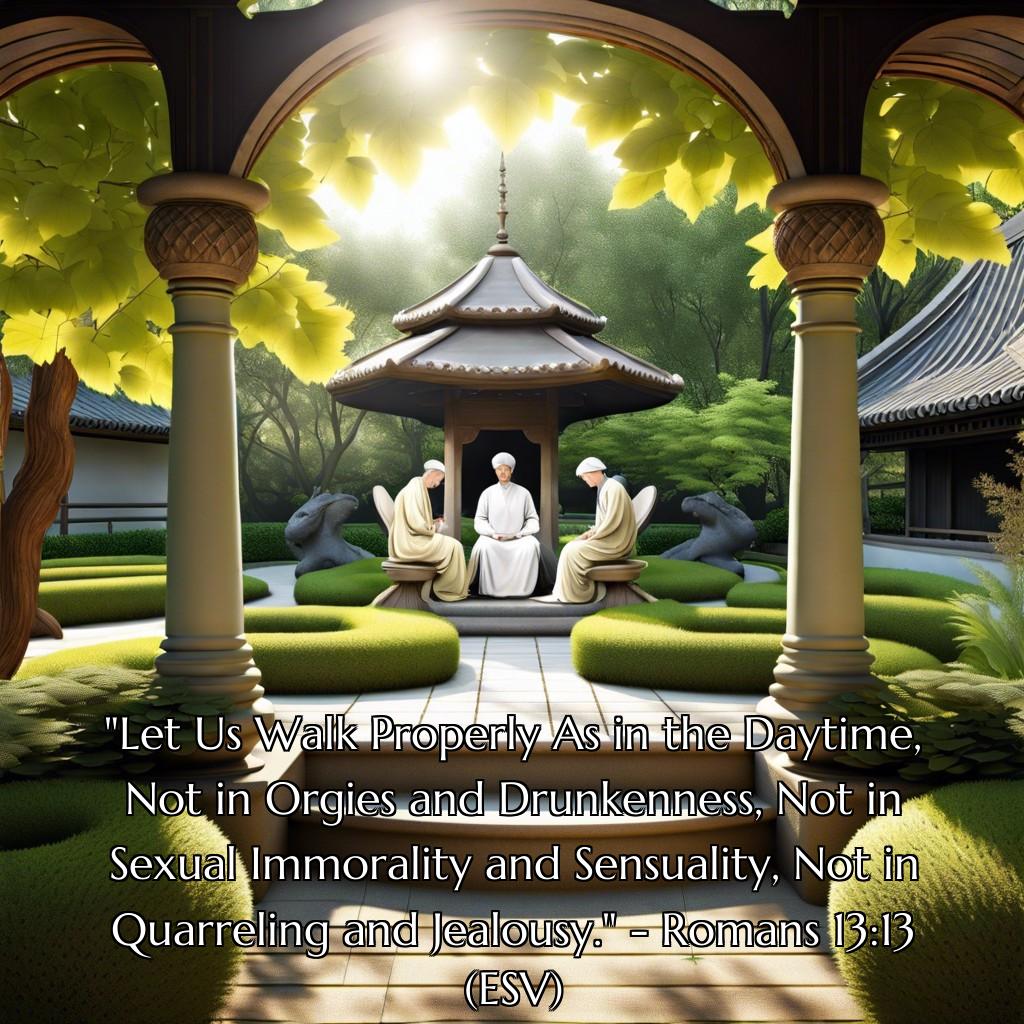This article explains the significance of 10 Bible verses about sex, shedding light on their meanings and implications.
Sexual morality is a significant theme throughout the Bible, offering wisdom and guidance for living a life aligned with God’s will. This article delves into key verses that address sexual behavior, highlighting the importance of purity, the sanctity of marriage, and the consequences of sexual immorality. Explore these biblical insights to better understand God’s perspective on sex and how it influences our spiritual and physical well-being.
“Flee From Sexual Immorality. Every Other Sin a Person Commits Is Outside the Body, but the Sexually Immoral Person Sins Against His Own Body.” – 1 Corinthians 6:18 (ESV)

Paul addresses the unique nature of sexual sin in this verse. It harms one’s own body in a profound way, different from other sins. This verse highlights:
- The personal impact: Sexual immorality affects both the physical and spiritual aspects of one’s being.
- The need for vigilance: Actively fleeing from such sin demonstrates a conscious commitment to purity.
- The call to respect our bodies: Recognizing our bodies as temples of the Holy Spirit encourages honoring them, aligning with God’s will.
Understanding these points can help believers maintain a lifestyle that honors God’s design for sexuality.
“Marriage Should Be Honored By All, and the Marriage Bed Kept Pure, for God Will Judge the Adulterer and All the Sexually Immoral.” – Hebrews 13:4 (NIV)

This verse underscores the sanctity of marriage. It emphasizes that marriage is to be respected by all, highlighting that the intimate relationship within marriage should remain pure. This purity isn’t just physical but also emotional and spiritual.
Adultery disrupts this sacred bond. It isn’t merely an act against a spouse but also against God. Fidelity within marriage represents a deep commitment, mirroring our faithfulness to God.
The warning against sexual immorality reflects God’s desire for us to lead lives of integrity. It implies that our actions have significant spiritual implications. Respecting these boundaries safeguards our relationships and aligns us with divine principles.
“But I Say to You That Everyone Who Looks At a Woman With Lustful Intent Has Already Committed Adultery With Her in His Heart.” – Matthew 5:28 (ESV)

Jesus emphasizes the significance of inner purity. In this verse, He shifts the focus from mere actions to the intentions of the heart.
- Lustful Intent: Lust isn’t just physical actions; it begins in the mind and heart. Jesus warns that even looking with lust is equivalent to adultery.
- Heart’s Role: The heart is central in biblical teaching. It’s viewed as the source of thoughts, emotions, and decisions. Guarding it against sinful desires is crucial.
- Holistic Purity: True righteousness involves more than external behavior. It requires a deep inner transformation aligning one’s thoughts and intentions with God’s will.
Approaching this verse, we see that Jesus calls for a comprehensive commitment to purity, extending beyond outward conduct to thoughts and desires.
“The Body Is Not Meant for Sexual Immorality but for the Lord, and the Lord for the Body.” – 1 Corinthians 6:13 (ESV)

1 Corinthians 6:13 speaks to the purpose and sanctity of the human body in the context of faith. This verse underscores the belief that our bodies are meant for more than mere physical desires.
First, it emphasizes that sexual immorality is a misuse of the body. The body is designed for higher purposes, aligning with God’s intentions.
Second, it highlights the connection between body and spirit. Sexual purity is not just about physical actions but about honoring God with every part of our being.
Third, this passage encourages believers to perceive their bodies as sacred vessels. The idea is to live in a way that reflects the divine purpose, steering away from actions that would defile this sanctity.
This perspective invites a holistic approach to faith, integrating our physical existence with our spiritual devotion. It’s about respect, discipline, and a deeper connection with the divine purpose for our lives.
“For This Is the Will of God, Your Sanctification: That You Abstain From Sexual Immorality;” – 1 Thessalonians 4:3 (ESV)

This verse underscores the importance of purity in a believer’s life. God desires sanctification, a process of becoming more holy and aligned with His will. Abstaining from sexual immorality is a crucial aspect of this journey.
Understanding your body as a temple can help reinforce the desire for sanctification. Treating it with respect brings clarity to the seriousness of avoiding sexual sins.
Moreover, obeying this teaching reflects a commitment to God’s design for humanity. Recognizing the gravity of sexual sin helps in making wiser choices aligned with spiritual growth.
Engaging in community and accountability can also provide support. Surrounding yourself with like-minded believers fosters an environment that encourages purity.
Ultimately, this verse calls for a dedicated effort to honor God through actions. Steering clear of sexual immorality isn’t just about following rules; it’s about deepening your relationship with Him.
“Let Us Walk Properly As in the Daytime, Not in Orgies and Drunkenness, Not in Sexual Immorality and Sensuality, Not in Quarreling and Jealousy.” – Romans 13:13 (ESV)

Paul emphasizes living a life consistent with living in the light, free from behaviors he describes as belonging to darkness. He contrasts the unrestrained indulgence of desires with a disciplined, righteous life.
– Orgies and drunkenness refer to chaotic gatherings and excessive drinking. These behaviors often lead to loss of control and regretful actions.
– Sexual immorality and sensuality highlight any sexual conduct outside God’s design for marriage. It stresses purity and respect for oneself and others.
– Quarreling and jealousy point out relational issues that arise from selfish desires. Peace and contentment in relationships are key to a godly life.
Paul’s advice is clear: live honorably, fostering integrity and respect in all aspects of life. Embracing these principles not only aligns with spiritual convictions but enhances personal well-being and relationships.
“But Among You There Must Not Be Even a Hint of Sexual Immorality, or of Any Kind of Impurity, or of Greed, Because These Are Improper for God’s Holy People.” – Ephesians 5:3 (NIV)

Paul emphasizes living a life that reflects God’s holiness. He outlines specific behaviors to avoid, thereby setting a high standard.
- Sexual immorality: Any sexual behavior outside the framework of marriage contradicts Christian living.
- Impurity: This includes thoughts, actions, and attitudes that are morally unclean.
- Greed: An insatiable desire for more, not limited to money but encompassing various earthly indulgences.
By steering clear of these actions, believers maintain a lifestyle that aligns with their holy calling. This verse encourages mindfulness in daily living, reflecting a commitment to God’s principles.
“Or Do You Not Know That the Unrighteous Will Not Inherit the Kingdom of God? Do Not Be Deceived: Neither the Sexually Immoral, nor Idolaters, nor Adulterers, nor Men Who Practice Homosexuality,” – 1 Corinthians 6:9 (ESV)

Paul makes a strong statement about the importance of righteousness and purity. He lists actions that are considered sinful and cautions believers that such behaviors distance them from God.
Sexual immorality, in this context, encompasses a range of actions that deviate from God’s design for sexual relations. This includes adultery, fornication, and other forms of unfaithfulness.
It’s a call for self-examination and repentance. Paul urges believers to live in a way that honors God, avoiding practices that lead to spiritual separation.
Idolatry, equated with placing anything above God, along with sexual sin, is highlighted as detractions from a holy life. These actions compromise one’s spiritual journey.
Paul’s message is clear: the path to inheriting God’s kingdom involves striving for purity and righteousness in all aspects of life, including sexual conduct.





